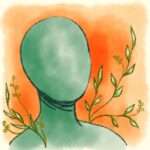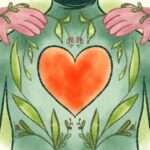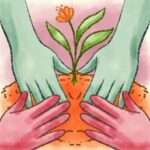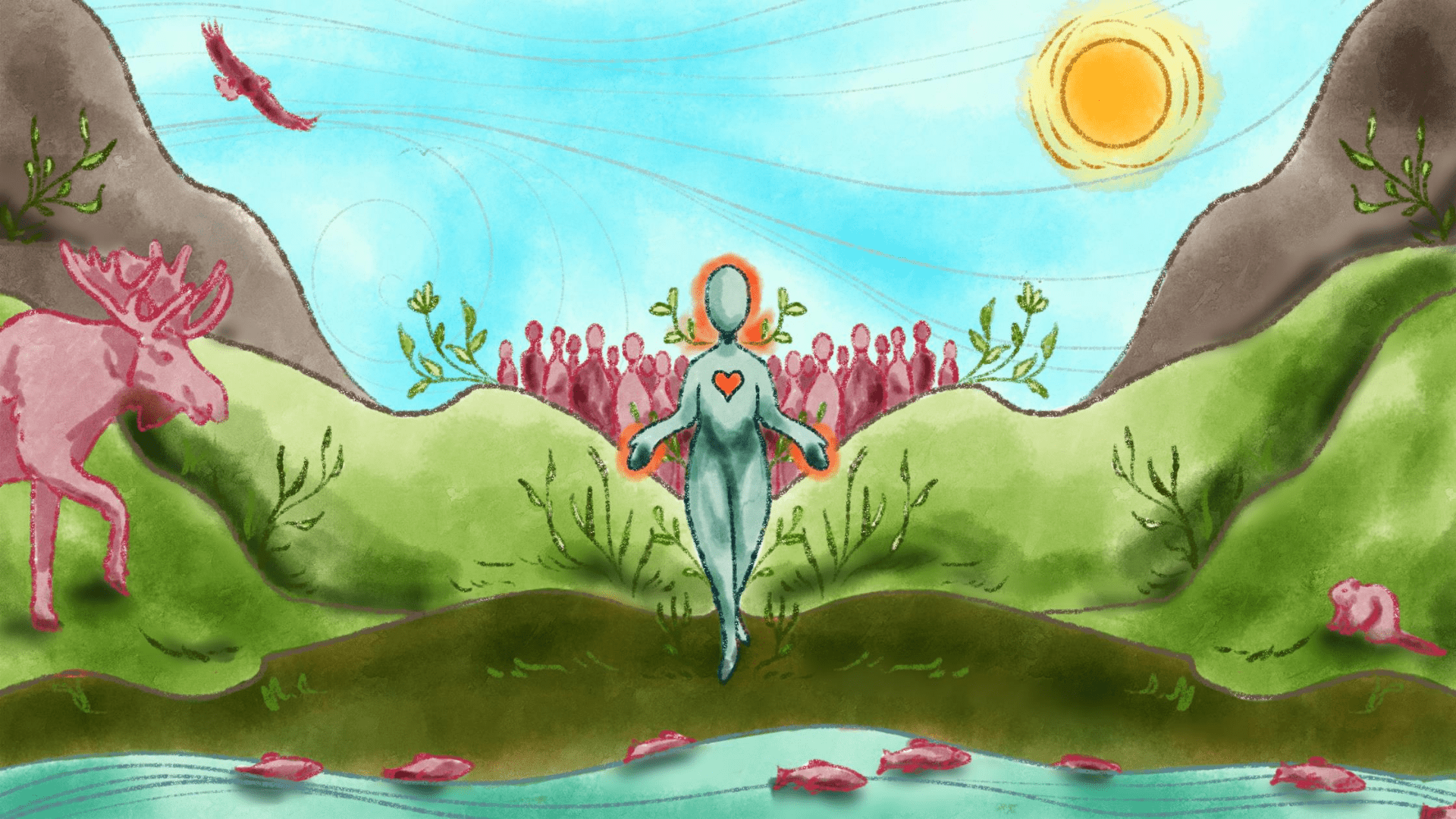
Nicole Cammaert
Director of Network & Sector Development
Much of the focus of my work and relationship building over the past year has been around decolonization and reconciliation, particularly through my role with the Decolonization Learning Journey (DLJ), offered to the sector in partnership with Unama’ki College. In recognition of the first (and long overdue) National Day for Truth and Reconciliation, I am sharing some of what has touched me so deeply about this work, as well as some thoughts about how as an individual and as an organization, this journey will continue.
Committing to decolonization and reconciliation is some of the most vital work of our time – not only as inhabitants of this land we call Canada, but as global citizens. As Treaty people in the process of unlearning, learning, and taking action, we are experiencing a range of emotions as we come to terms with our role in history. With the discovery of the unmarked graves of thousands of Indigenous children and the trauma Indigenous peoples are continuously facing, finally, pleas are being heard. Stories from Canadian Residential Schools are at last being listened to and believed. As I talk to my Indigenous friends and Elders, and listen to and read the stories being heartbreakingly surfaced and shared, I’m reminded of this calling from a past Collective Trauma Summit:
“The time has come for us to connect. You’ve been hearing my voice, and I’ve been listening to you too. The way out of your current challenges, and mine… is together. I am calling all the peacemakers, the changemakers, the artists, activists, healers, agents of transformation, and lovers of life and this planet…
To heal our personal, collective, and intergenerational trauma. The only way through is together. Our way forward is opening, we must simply take the steps.”
Elder Jane Meader of Membertou First Nation wisely adds that all creation stories (not just Indigenous stories) are about teaching us how to live on the Earth, how to be kind to the Earth, how to be kind to each other, and how to walk in love and peace on Earth. She instructs us to, “Soften our walk on Mother Earth. Soften our hearts. Learn to love again. To stop walking in fear, but rather to walk in love. We’ll create a much better Earth for all the children coming and for future generations. It’s up to each one of us as individuals.” These are vital teachings and part of the essence to reconciliation.
Toward Reconciliation Action
The DLJ began in September 2018 at a CSCNS board and staff retreat and then evolved into a 15-part learning series that wrapped up earlier this year in May. Participants attended from across sectors and the country, and were hosted by myself, Elder Jane Meader, and Mary Beth Doucette (Assistant Professor and Purdy Crawford Chair in Aboriginal Business Studies at Cape Breton University). This series was made possible by a unique partnership with Unama’ki College at Cape Breton University and the leadership of Associate Vice President of Indigenous Affairs and Hereditary Chief of the Mi’kmaq Grand Council, Stephen Augustine. We are grateful to each of them for their leadership, vision, generosity, and commitment on this journey.
Jane Meader was an incredible teacher throughout the DLJ. She outlined four critical components for the move toward reconciliation:
-
- Formal apologies: For the trauma experienced at Indian Residential Schools at the hand of the Canadian Government and Catholic Church.
- Acts of forgiveness: Indigenous Peoples to forgive government and the church when they are ready. And non-Indigenous people to forgive themselves – to not hold personal fault, but rather hold the legacy of our ancestors and commit to the next step of restitution.
- Acts of restitution: Such as learning the history, learning about Indigenous Peoples, and walking hand in hand with them to undo some of the wrongs that have been done.
- Reconciliaiton: Only after the commitments 1-3 have been made does true reconciliation become possible – where we can walk together as full partners to have and create a better life and future for all.
We are creating the path as we walk it. It is non-linear and often circles back on itself. Sometimes we will move quickly, and sometimes we will stumble and need to stop to reflect or to regroup. But the vital piece is that we go steadily together, and we go in love, peace and friendship, just as our Treaties bond us to one another.
This work is both our individual and collective responsibility. As Annie Battiste states, “It is our responsibility and it is imperative, as Treaty People and because it’s embedded in our constitution, our Charter of Rights and Freedoms, and in UNDRIP.” Our approach thus far has been four-pronged:
-
- Listen, Listen, Listen. Now is the time to listen to the Elders and Knowledge Keepers. With open hearts and our defenses down, let new knowledge settle and simmer before asking questions or engaging in dialogue. Patience, humility, and listening.
- Unlearn and Learn. Open our minds and our hearts to unlearn the history we were taught and to relearn Canada’s shared history between Indigenous and non-Indigenous people and the impacts of colonialism.
- Reflect. Take the time to reflect and to educate ourselves on the injustices and trauma inflicted onto Indigenous people (past and present). Grasp an understanding of cultural genocide and to know that these systems of oppression have benefited us as settlers while Indigenous Peoples still experience vast inequities, intergenerational trauma, and systemic racism (in housing, health, education, the justice system, human rights, and in societal attitudes and beliefs).
- Act. Ask how can I be of service? How to I decolonize myself and affect change in my organization and greater society? And then act in right relationship through wise action.
In addition, we’ve been guided by a framework that outlines how we can think about the role of our senses in the path to reconciliation:
 Head:
Head:
We can start by opening our minds in preparation to discomfort as we begin our journey to understanding. Learning about our history, Treaties, UNDRIP, the Indian Act, and other aspect of colonization is a starting point for reconciliation.

Heart:
We need to feel and connect with the lived experience of Indigenous peoples and their stories. By developing relationships, we can grow our empathy and use our hearts to feel and understand. Understand the heart, spirit, and trauma of lived experience.
 Hands:
Hands:
Once we have deepened our head and heart learning, we can begin to act wisely and in right relations. Sometimes we can find ourselves experiencing paralysis due to a fear of discomfort or getting it wrong, which emphasizes the need to do our head and heart work continuously. Understanding that we may make mistakes, it is time for us to step bravely into action!
This path of Head, Heart and Hands is more like a labyrinth than a ladder. The path to the centre looks short and direct but rather it weaves in and around itself, each step part of the winding journey to the centre. The walk to of the labyrinth is like the internal journey to our hearts, while the return journey is the like external action. You can’t go out, unless you go in. There are no short cuts, there are no dead ends. I think of this as a metaphor to what one’s journey might be like in reconciliation work – beginning with unlearning and learning, and then deepening this learning to the heart though listening to the stories, lived experience, and the remarkable resilience and creativity of Indigenous Peoples. Deepen your empathy and understanding, and then act wisely with good intention.

Earlier this week, as we gathered in Tatamagouche with a number of changemakers across Nova Scotia, Elder Albert Marshall taught us that we are swimming in knowledge yet starving for wisdom. We need to turn to Indigenous teachings and ways of being, listen to this wellspring of wisdom, reflect, and allow it to find a home in our hearts. This will help guide our work.
Wherever you are in your personal or organizational decolonization journey, Annie Battiste lovingly reminds us in DLJ webinar #14 that, “We are not personally responsible or guilty for wrongs committed before we were born, but we cannot escape the legacy of those wrongs and their privileges” and that we must “Be open to new cultural experiences, step out of your comfort zone and embrace discomfort as a way of seeking new insights about your understanding of Treaty or Aboriginal people.” In her presentation Annie jokingly, but truthfully declares, “If you’re doing Reconciliation work and you don’t want to quit at least once a week, you might not be doing hard reconciliation!” Working to reconcile centuries of harm is not easy, but it is some of the most necessary work today and it’s important to walk together to support this work.
Reconciliation Game Changers
As we mark this inaugural National Day for Truth and Reconciliation, we need to remind ourselves that reconciliation is an every day effort. As Ta7taliya Michelle Nahanne says, “September 30th is a day when Indigenous people should not have to perform our trauma to make people care.” We need to take responsibility for our own learning, and the CSCNS is here to support that journey. In DLJ webinar #9 titled “Residential Schools Moving Forward”, Senator Dan Christmas passionately shares his four “Game Changers” for reconciliation (full slide deck here).
In case you missed the DLJ webinars, we’ve curated some links below to videos that connect to each of these game changers. We hope that by opening your mind to this learning, you’ll move closer to the heart work of relationships and the hands work of action for reconciliation.
Game Changer #1: Indigenous Peoples can look after themselves
- Language: The Heart of Culture link to video
- Myths and Truths about Indigenous Rights link to video
- Residential Schools Moving Forward link to video
- Kepmitelsi: Being Two-Spirit in a Colonial World link to video
Game Changer #2: Indigenous Peoples should enjoy the same quality of life as other Canadians
- Decolonizing Education: Nourishing the Learning Spirit link to video
- Culturally Relevant Education link to video
- Reconciliation Action Acceleration: From Head, Heart and Hand link to video
Game Changer #3: Non-Indigenous Peoples need to strive for intercultural understanding, empathy and mutual respect for Indigenous Peoples
- Residential School: One Person’s Story of Survival: link to video
- National Inquiry into Murdered and Missing Indigenous Women and Girls Link to video
- Netukulimk, Harvesting, Sustainable Ways of Living, and Seven Generations link to video
- Etuaptmumk / Two-Eyed Seeing: Ways of Knowing for the Benefit of All link to video
Game Changer #4: Our relationship needs to be based on the principles of mutual recognition, mutual respect and shared responsibility
- The Creation Story and Pre-Contact Way of Life link to audio track
- Mi’kmaq Governance Systems link to video
- Contact and Historical Conflicts, Treaties, and Significance of Indigenous People’s Day link to audio
- Indian Reserves, the Indian Act, and Confederation link to video
Final Thoughts
This journey is only beginning for myself and CSCNS. Personally, I have a new mantra for my commitment to this work: Be fierce AND rest, Be brave AND Humble. To me, this is about having an unrelenting internal and external commitment to being a reliable ally while also knowing that in order to be of service, I must also rest and care for myself, and model that for my children. It is also a call to step into the places that feel scary and perhaps unchartered, and to do so with love, humility, and wonder. I hope to meet you on this journey!
For CSCNS, we are committed to incorporating justice, equity, diversity, decolonization and inclusion (JEDDI) across the learning and networking opportunities we offer to the sector, as well as internally in our own organization and through our relationships and partnerships. We are developing a culture of being a learning organization and we know that in this is new and big work we will stumble and make mistakes. In the near future we plan to offer:
- An Indigenous Ally Toolkit for reconciliation implementation practices
- A Reconciliation Action Community of Practice and Learning cohort
- A 2-part series on Trauma Informed Practice in organizations
We are sharing the ideas and links below to help you in your ongoing decolonization learning journey. They are organized by the head, heart, hands framework introduced in the blog. We hope you find them helpful and inspiring!
- Educate yourself and your family about Indian Residential Schools and Orange Shirt Day and Phyliss Webstad’s story
- Learn the Treaties, particularly the following 3 that are important for Nova Scotia:
-
- Treaty of 1725/26 “The Boston Treaty” or sometimes called “The Mother Treaty”
- Treaty of 1752
- Treaty of 1760/61
- The Marshall Decision
- Listen to Stephen Newcombe speak on the meaning and implications of the Doctrine of Discovery” https://youtu.be/_EBno7CiSfU
- Read and understand UNDRIP and Bill C-15
- Check out CBC’s “Beyond 94” website, an interactive website that details the Calls to Action, and monitors the work done for each
- Read the summary report of the TRC’s 94 Calls to Action
- Read “Reclaiming Power and Place: The Final Report of the National Inquiry into Murdered and Missing Indigenous Women and Two-Spirit People”
- Watch TV shows with your family, such as the ones on the CBC playlist for Sept 30th
- Watch the Creation Story by Stephen Augustine
- Think about yourself in relation to the water and land within the context of your own family’s culture and lineage
- Reflect and write down your commitments and contributions to Truth, Reconciliation and Right Relations. Ask yourself: What can I live into for myself, my family, my organization? Knowing that leadership is a gift, what gifts, skills, roles and relations can I bring to these commitments?
- Seek out first person, lived experience stories such as the ones in the Decolonization Learning Journey:
- Residential School: One Person’s Story of Survival
- National Inquiry into Murdered and Missing Indigenous Women and Girls
- Consume and purchase Indigenous music, poetry and art
- Listen to Alex Poulette’s song “Forgiveness” https://youtu.be/TB1rjotkBZ0
- Seek out the many, many stories of resilience and creativity from Indigenous peoples
HANDS
- Create a process for meaningful dialogue with Indigenous people (this will take time, money and energy)
- Merge social reconciliation with economic reconciliation – put your money where your intentions are by supporting local Indigenous organizations and hiring Indigenous people
- Teach your children about our history and Indigenous culture. Take them to a Pow Wow, learn common greetings in Mi’kmaq (check out the free app “L’nui’suti“)
- Listen and watch Annie Battiste’s webinar “Reconciliation Action Acceleration: From Head, Heart and Hand” for ways to take action in your organization. She suggests the following for short-term action:
- Locate yourself within the Treaties
- Create a process for ensuring meaningful dialogue with Mi’kmaw people
- Create Cultural Awareness Baselines within your organization
- Hire Indigenous people in non-contracted or Indigenous specific positions.
- For longer-term action:
- Decolonize your HR department
- Create workplans, strategies, and performance reviews that are reconciliation focused
- Learn about and practice trauma-informed communication
- Join CSCNS’s Reconciliation Action Community of Practice (coming late fall 2021).

Wela’loiq-Thank you, CSCNS for presenting this important information.This is a very good and informative read and I have downloaded and save in my T&R file. I will share with others.
I’m so glad you found it helpful, John. Thank you for sharing!
Warmly,
Nicole
This is wisdom in its purest form. Thank you for weaving together the emotions of the moment, the history, the trauma, and the culture. You have helped lay a personal path forward for me – one that is mine to own, to learn and to pursue, but with some excellent guideposts to look for and discover. A fine piece of work and thank you for sharing. I will read this often. Nick
I’m so glad this has resonated so deeply, Nick. The Decolonization Learning Journey webinar series is one I’ll also continue to come back to. The Elders and Knowledge Keepers have shared so much wisdom and a compassionate call to action.
Stay tuned for future offerings.
Warmly,
Nicole